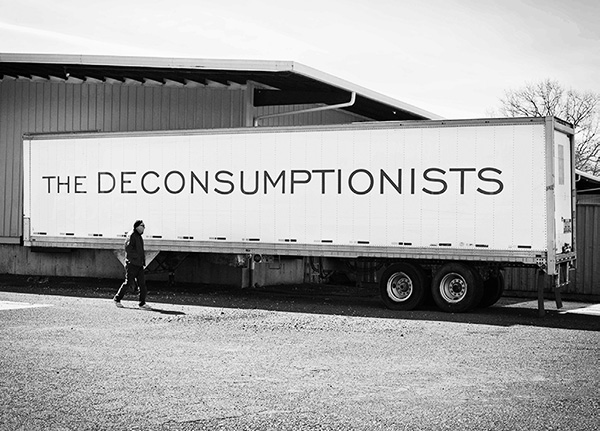
THE DECONSUMPTIONISTS ART AS ARCHIVE
first performed on June 6, 2014
Museum of Contemporary Art Detroit, Detroit, MI
performed nineteen times in 2014
EIDIA / MELISSA P. WOLF, PAUL LAMARRE
New York City, NY
667798028e667798028i667798028d667798028i667798028a667798028h667798028o667798028u667798028s667798028e667798028@667798028e667798028a667798028r667798028t667798028h667798028l667798028i667798028n667798028k667798028.667798028n667798028e667798028t
eidia.com
THE DECONSUMPTIONISTS ART AS ARCHIVE
EIDIA / MELISSA P. WOLF, PAUL LAMARRE
EIDIA, our collaborative identity (Melissa P. Wolf and Paul Lamarre), performed in Detroit, June 6-29, 2014 during a month long DEPE Space residency at MOCAD, the Museum of Contemporary Art Detroit.
“The Deconsumptionists: Art As Archive” disseminates knowledge of the archiving of our life’s production through exhibitions, performance and lectures. Inside a 48 ft semi-trailer, 50% of the interior is exhibition space with the remainder housing 171 boxes of previously created artworks spanning our 30 year collaboration. A photographic record has been made of the contents of each box. Performances by us or with other artists are a significant aspect of “The Deconsumptionists: Art As Archive” trailer—nomadic hybrid art archive and exhibition space with a solar panel array roof.
This performance took place within the trailer over a nineteen-day period coinciding with MOCAD’s museum hours. We personally engaged with over 300 visitors, in situ, disseminating knowledge through performance and discussion incorporating photographs, text and video (single channel) as well as staging collaborative exhibitions inside the trailer and museum—organizing and moderating a panel discussion on “artist run spaces” (June 20) with representatives from five Detroit galleries and one based in Toledo.
Our performance raised tough questions about sustainable life practices for the artist and non-artist alike. What art are you making now or do you plan to make, and what is your strategy for all the “physical” objects you plan to generate throughout your art career? With potentially hundreds of accumulated paintings or sculptures, what “future” will all that you create have?
Our practice posits the modality of reassembling, repositioning and reshaping the found object, as well as previously created artworks, to provoke a differing (counter) conversation about production and consumption. By questioning what our responsibility is as “cultural producers,” we present the struggles and contradictions of the production of art within the capitalist economic model—questioning the current model of production and consumption, with a particular focus on the environment. By example, we propagate the possibilities that recycling can bring to an art practice, as well as to design and progressive architecture.